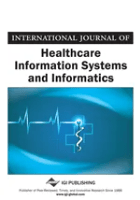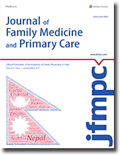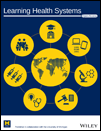
JOURNAL OF TELEMEDICINE AND TELECARE
Scope & Guideline
Transforming healthcare through innovation and research.
Introduction
Aims and Scopes
- Telehealth Interventions and Effectiveness:
The journal emphasizes research on various telehealth interventions aimed at improving patient outcomes across a wide range of conditions, including chronic diseases, mental health disorders, and rehabilitation. - Technological Innovations in Telemedicine:
The journal explores the role of emerging technologies such as mobile health applications, telemonitoring devices, and artificial intelligence in enhancing telemedicine services and patient care. - Health Equity and Access:
Research on telehealth's impact on health disparities and access to care, particularly among underserved populations, is a critical focus area. The journal seeks to highlight how telemedicine can bridge gaps in healthcare access. - Methodological Approaches in Telehealth Research:
The journal encourages diverse research methodologies, including randomized controlled trials, systematic reviews, qualitative studies, and economic evaluations, to assess the efficacy and implementation of telehealth. - Policy and Implementation Strategies:
The journal addresses the need for effective policies and strategies to implement telehealth solutions in various healthcare settings, particularly in response to evolving healthcare needs during public health emergencies.
Trending and Emerging
- Integration of Artificial Intelligence in Telehealth:
There is a notable increase in studies focusing on the integration of AI technologies in telehealth services, enhancing diagnostic accuracy, patient monitoring, and personalized care. - Telehealth for Mental Health Services:
Research on telehealth applications for mental health care is on the rise, particularly in light of the increased demand for accessible mental health services during and after the pandemic. - Remote Patient Monitoring Innovations:
The emergence of innovative remote patient monitoring technologies is a growing trend, with research focusing on their effectiveness in managing chronic conditions and improving patient engagement. - Telehealth Equity and Accessibility:
An increasing emphasis on health equity and accessibility in telehealth research is evident, with studies exploring how telehealth can serve marginalized communities and reduce disparities in healthcare. - Multidisciplinary Approaches to Telehealth:
There is a trend towards multidisciplinary research that combines insights from various fields—such as technology, healthcare, and social sciences—to better understand and improve telehealth services.
Declining or Waning
- Traditional Face-to-Face Care Comparisons:
Research comparing telehealth with traditional face-to-face care has decreased as telehealth becomes more mainstream. The focus is shifting towards optimizing telehealth itself rather than contrasting it with in-person visits. - Telehealth for Non-Urgent Conditions:
The volume of studies addressing telehealth for non-urgent conditions has waned, likely due to the increased prioritization of urgent and chronic care management during the COVID-19 pandemic. - General Surveys on Telehealth Acceptance:
Generalized surveys assessing patient and provider acceptance of telehealth are less frequent, with a shift toward more specific and nuanced studies that explore particular populations or conditions. - Telehealth Utilization Trends During COVID-19:
As the pandemic evolves, research specifically focused on telehealth utilization trends during COVID-19 is decreasing, with a growing interest in post-pandemic implications and sustained telehealth practices. - Telehealth Training for Providers:
Research on telehealth training programs for healthcare providers has diminished, suggesting a shift in focus towards implementation and outcomes rather than foundational training.
Similar Journals

Applied Clinical Informatics
Advancing patient outcomes with cutting-edge informatics solutions.Applied Clinical Informatics is a leading journal dedicated to the expanding field of health informatics and its applications within clinical settings. Published by GEORG THIEME VERLAG KG in Germany, this journal serves as a pivotal platform for researchers and professionals engaged in the integration of technology and healthcare, aiming to improve patient outcomes through innovative informatics solutions. With a solid Q2 ranking in multiple disciplines including Computer Science Applications, Health Informatics, and Health Information Management, it reflects its prominent position in the academic landscape. The journal provides accessible content while fostering dialogue on key issues and advancements in clinical informatics. Covering a wide array of topics from data management to e-health applications, Applied Clinical Informatics is essential reading for those looking to stay attuned to the latest research and developments from 2009 to 2024, enriching the knowledge base of students, professionals, and researchers worldwide.

TECHNOLOGY AND HEALTH CARE
Advancing Health Through Technological IntegrationTECHNOLOGY AND HEALTH CARE, published by IOS PRESS, stands as a prominent interdisciplinary journal dedicated to the integration of technology within the healthcare sector. With an ISSN of 0928-7329 and an E-ISSN of 1878-7401, this journal has been a vital resource since its inception in 1993, providing insights and advancements in various categories including bioengineering, biomedical engineering, health informatics, and more. Though it currently holds a Q4 classification in several fields and Q3 in others, it actively contributes to the dialogue surrounding innovative methodologies and practices that enhance healthcare delivery. Researchers, professionals, and students will find the journal invaluable for its diverse range of studies that explore the convergence of technology and health. Its commitment to fostering impactful research continues to reinforce its relevance in the evolving landscape of healthcare technology.

International Journal of Healthcare Information Systems and Informatics
Pioneering solutions for a data-driven healthcare landscape.International Journal of Healthcare Information Systems and Informatics is a prestigious academic journal published by IGI Global, focusing on the vital intersection of healthcare and information technology. With an ISSN of 1555-3396 and E-ISSN of 1555-340X, this journal serves as a pivotal platform for researchers, professionals, and students to explore innovative solutions and advancements in healthcare informatics. As of 2023, it holds a commendable Q3 ranking in categories such as Information Systems and Medicine, highlighting its significant contribution to the academic community. Covering a wide range of topics from healthcare data management to the implementation of information systems in clinical settings, the journal aims to foster critical discussions and disseminate impactful research. With a publication history spanning from 2006 to 2024, it continues to play a crucial role in guiding the future of healthcare information systems. Readers can access this journal through traditional subscription methods, ensuring that leading-edge research reaches those most invested in the evolution of healthcare informatics.

BMJ Health & Care Informatics
Empowering Research to Revolutionize Health Care IntegrationBMJ Health & Care Informatics, published by the esteemed BMJ Publishing Group, stands at the forefront of the rapidly evolving field of health informatics. Established as an Open Access journal in 2019, it is dedicated to disseminating high-quality research that enhances the integration of health care with information technologies. With a prominent Q1 ranking in 2023 across categories such as Computer Science Applications, Health Informatics, and Health Information Management, this journal serves as an essential resource for researchers and practitioners alike. The journal is indexed in reputable databases and boasts impressive Scopus ranks—notably, it is placed #43 among Health Informatics journals. The aim is to foster innovation and understanding in health care practices through rigorous research and collaboration. Encompassing a wide spectrum of topics within health data science, usability, and outcomes research, BMJ Health & Care Informatics is pivotal for anyone involved in advancing health care through technology.

Digital Health
Advancing Knowledge at the Intersection of Health and Technology.Digital Health is a pioneering open-access journal published by SAGE Publications Ltd, dedicated to advancing the field of health technology and its intersection with health policy, informatics, and the broader medical landscape. Since its inception in 2015, the journal has rapidly established itself as an essential resource for researchers, professionals, and students, serving as a platform for innovative research that leverages digital tools to improve health outcomes. Currently ranked in the Q2 category across four relevant domains, including Computer Science Applications and Health Informatics, it commands respect within the academic community. With its accessible framework, Digital Health facilitates the dissemination of critical findings and new methodologies that inform policy and practice. The journal’s commitment to open access promotes worldwide access and cooperation, making significant contributions to the evolving landscape of digital health.

INFORMATION RESEARCH-AN INTERNATIONAL ELECTRONIC JOURNAL
Pioneering Insights for a Global Information Community.INFORMATION RESEARCH - AN INTERNATIONAL ELECTRONIC JOURNAL is a distinguished open-access journal published by the University of Sheffield's Department of Information Studies, situated in England. Since its inception in 1995, the journal has been at the forefront of disseminating research findings in the field of Library and Information Sciences, earning a commendable Q2 ranking in the category for 2023. With an ISSN of 1368-1613 and an E-ISSN of 1368-1613, it serves as a vital resource for scholars, practitioners, and students alike, providing a platform for innovative insights and engaging discussions. The journal accepts submissions from diverse perspectives related to the information research domain and contributes to the ongoing dialogue among academic professionals worldwide. With a Scopus ranking placing it at 150 out of 280 in its field, this publication underscores its importance in shaping the future of information studies while enabling wide accessibility to cutting-edge research.

Journal of Family Medicine and Primary Care
Connecting Research and Real-World Impact in Family MedicineThe Journal of Family Medicine and Primary Care is a premier, peer-reviewed academic journal dedicated to the fields of family medicine and primary healthcare. Published by Wolters Kluwer Medknow Publications, this Open Access journal has been providing a platform for the dissemination of valuable research since 2012, offering researchers, practitioners, and scholars unrestricted access to a wealth of knowledge in primary care practices, policies, and innovations. The journal seeks to bridge the gap between academia and practice by publishing original articles, reviews, and case studies that address contemporary issues in family medicine, thereby enhancing patient care and outcomes. With a commitment to advancing the field, the journal serves as an essential resource for those striving to improve the delivery and effectiveness of healthcare services within families and communities.

Telemedicine and e-Health
Leading the charge in e-health research.Telemedicine and e-Health is a leading academic journal published by MARY ANN LIEBERT, INC, dedicated to advancing the fields of telemedicine and digital health technologies. With an ISSN of 1530-5627 and an E-ISSN of 1556-3669, this journal plays a crucial role in disseminating groundbreaking research and practical applications within the rapidly evolving intersection of healthcare and technology. Converging from 2000 to 2024, it consistently ranks in the top quartiles of health informatics and health information management, underscoring its significant contributions to the broader medical community. As part of its commitment to fostering innovation and knowledge dissemination, Telemedicine and e-Health provides researchers, healthcare professionals, and students with access to high-quality, peer-reviewed articles that inspire and inform practices in clinical settings. The journal's impressive impact, reflected in its Scopus rankings—#11 in Health Information Management and #26 in Health Informatics—demonstrates its relevance in the academic landscape and its role in shaping the future of healthcare delivery through digital solutions.

JAMA Health Forum
Leading the Conversation on Health StrategiesIntroducing the JAMA Health Forum, a premier journal published by the American Medical Association, dedicated to advancing knowledge in the critical fields of health policy and public health. Since its inception in 2020, this open-access journal has emerged as a leading platform for high-quality research, achieving a distinguished Q1 ranking in both Health Policy and Public Health, Environmental and Occupational Health for 2023. With an ISSN of 2689-0186, it provides a vital resource for researchers, policymakers, and students alike, facilitating widespread dissemination of impactful studies that aim to shape health strategies and improve community health outcomes. The JAMA Health Forum not only fosters collaboration among experts but also enhances global discussions on pressing health issues, making it an essential read for anyone involved in health-related research and practice.

Learning Health Systems
Fostering collaboration for transformative health advancements.Learning Health Systems is a premier open access journal published by WILEY that has been at the forefront of innovation in the fields of Health Informatics, Health Information Management, and Public Health since its inception in 2016. With a dedicated focus on the intersection of clinical practice and health technology, this journal is pivotal for researchers, professionals, and students seeking to advance the knowledge base in these critical areas. The journal enjoys a robust reputation, boasting a Q1 ranking in multiple categories as of 2023, and ranking within the top percentiles in both Medicine and Health Professions across various metrics. Designed to foster collaboration and dissemination of cutting-edge research, Learning Health Systems is committed to bridging gaps between data science and practical health applications while providing an accessible platform for transformative ideas. It invites contributions that challenge existing paradigms and promote innovative solutions that enhance healthcare delivery and patient outcomes.